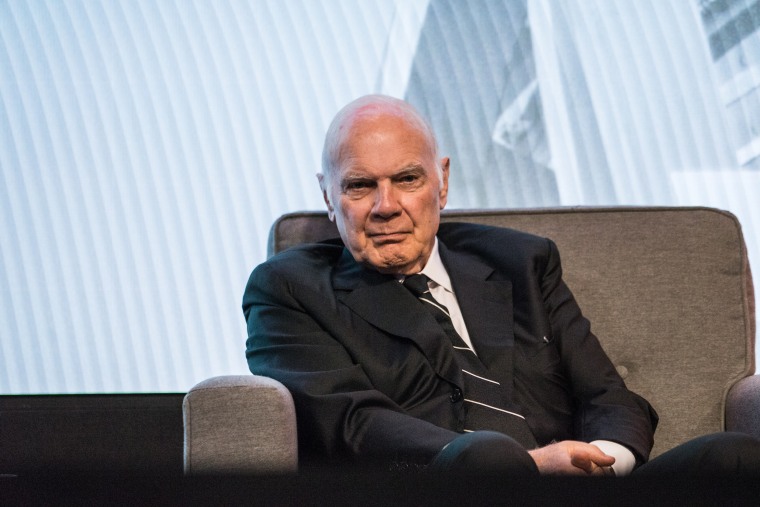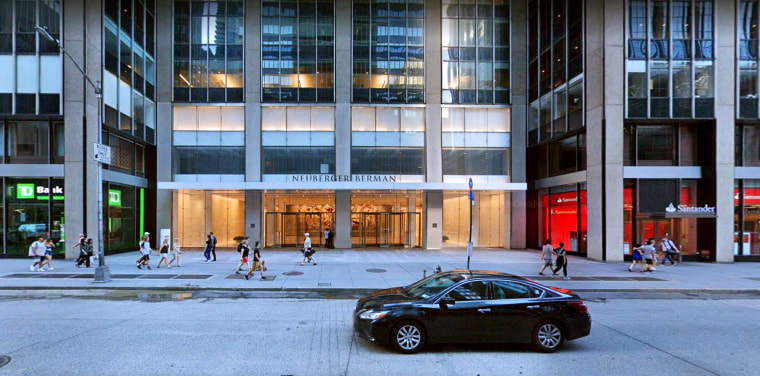 Vornado Realty Trust" width="2500" height="1667" />
Vornado Realty Trust" width="2500" height="1667" />Vornado's Steven Roth is mulling withholding cash flow from two buildings Vornado co-owns with Trump, which could make Trump sell his stake at a discount.
Get more news Live Feb. 12, 2021, 10:00 AM UTCWhile Donald Trump undergoes a second impeachment trial in Washington, he is also confronting a potent threat to the crown jewel of his real estate holdings, according to a person familiar with the matter.
The threat, involving a highly profitable real estate partnership that generates significant cash for the Trump Organization, is ratcheting up pressure on the former president as his real estate and hospitality operations struggle under hefty debt and vastly reduced revenues, largely a result of the coronavirus pandemic.
The partnership owns two first-class commercial buildings — one on Sixth Avenue in New York City and the other in downtown San Francisco — and it is the single most profitable asset in the Trump empire. The Trump Organization owns a 30 percent stake in the buildings, while its partner, Vornado Realty Trust, a huge public real estate concern in New York City, owns 70 percent.
Watch Cynthia McFadden on "NBC Nightly News with Lester Holt" tonight for more on this story.
But now Steven Roth, Vornado's powerful founder and chairman, is considering whether to withhold the partnership's cash flows from Trump, said a person familiar with the matter. Such a move would slash the Trump Organization's cash receipts, and it could force Trump to sell his stake back to Vornado at a discount, leaving him with a smaller gain and eliminating a crucial source of cash.
In an interview, Eric Trump, Trump's son, declined to answer questions about discussions with Vornado on the record. "We're incredibly proud of these two buildings," said Trump, who is executive vice president of the Trump Organization. "They are two of the best commercial assets anywhere in the world."
A spokesman for Vornado didn't return a phone call or an email seeking comment.
The Wall Street Journal first reported that Roth is considering ways to exit the partnership with Trump, including holding back on the partnership's cash flows. Controlling partners in such deals have great leeway to run their operations as they see fit.
Trump has owned the stake in the two buildings for more than a decade, and his minority holding was recently estimated at $784 million, according to Forbes magazine, after Trump's share of debt on the buildings, estimated to be $445 million.
Almost $400 million in debt backed in part by Trump International Hotel in Washington, D.C., and the Trump National Doral golf resort in Miami starts to come due in 2023. And while a sale of his partnership back to Vornado would provide something of a cushion for paying down that debt, getting top dollar for the stake is critical.
The cash generated by the Trump Organization's ownership of the two buildings with Vornado is essential given the Covid-19-related economic downturn savaging his other properties. According to Trump's federal financial records filed last month, most of the properties are hemorrhaging revenues.
 Vornado Realty Trust" width="2500" height="1667" />
Vornado Realty Trust" width="2500" height="1667" />
For example, revenues at the Doral property fell by 43 percent last year from the previous year, while revenues at Trump International Hotel in Washington's Old Post Office Building fell by 63 percent, to $15.1 million, the Trump filings show.
Revenues from Trump's Florida retreat at Mar-a-Lago were up by 13 percent, the filings state, and two of the golf courses generated single-digit sales increases, but most of the Trump properties registered declines in revenues last year from 2019.
Hefty amounts of cash are required to maintain those properties, experts said.
"If he doesn't keep the facilities in good maintenance and up to date, the ability to attract future business becomes impaired," said Adam J. Levitin, a professor at the Georgetown University Law Center who specializes in bankruptcy and commercial law. "He needs money to keep running the facilities," Levitin said, and if the facilities aren't turning out enough money to cover the debt and maintain themselves, "that can set off a downward spiral."

The idea that Vornado might withhold cash flows from the partnership arose recently, the person familiar with the matter said, after the Jan. 6 riot at the U.S. Capitol and unsuccessful attempts last year to sell the buildings for around $5 billion or refinance them. Some banks associated with Trump have also cut their ties to him.
After the riot, reports said some of his tenants in other buildings asked to exit their leases; one was the Girl Scouts of America, in his office building at 40 Wall St. in New York.
Litigation would be likely if Vornado decides to withhold income from Trump generated by the partnership's properties, real estate experts said. But because Trump's other operations aren't doing well, he isn't negotiating from a position of strength.
Trump's heavy debt and his operations' revenue shortfalls put Vornado in a good position to force Trump to take a discounted price for his partnership stake, the person familiar with the matter said.
Even before the Capitol riot, Trump's net worth had plummeted, according to Forbes' billionaire rankings. At the start of his presidency, the magazine estimated his net worth at $3.5 billion; now the estimate is $2.5 billion.
"When you polarize your business by becoming a political figure, then you lose a lot of potential customers," said Dan Alexander, a senior editor at Forbes and author of "White House, Inc.: How Donald Trump Turned the Presidency into a Business." "He's still, at his core, a commercial real estate mogul. When his big customers, which are tenants that pay millions upon millions upon millions of dollars a year, when those leases start expiring, that's when we're going to find out what the real effects of all this were."
Gretchen Morgenson is the senior financial reporter for the NBC News Investigative Unit. A former stockbroker, she won the Pulitzer Prize in 2002 for her "trenchant and incisive" reporting on Wall Street.
Cynthia McFadden is the senior legal and investigative correspondent for NBC News.
Anna Schecter is a senior producer in the NBC News Investigations Unit.